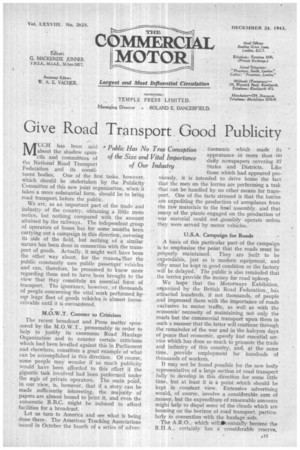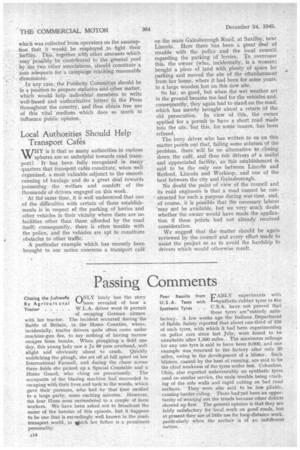Give Road Transport Good Publicity
Page 15

Page 16

If you've noticed an error in this article please click here to report it so we can fix it.
MUCH has been said about the shadow councils and committees of the National Road Transport Federation and its consti tuent bodies. One of the first tasks. however, which should be utdertaken by the Publicity Committee of this new joint organization, when it takes a more substantial form, should be to bring road transport before the public. We are, as an important part of the trade and industry of the country, obtaining a little more notice-, but nothing compared with the amount attained by the railways. The independent group of operators of buses has for some months been carrying out a campaign in this direction, covering its side of the field, but nothing of a similar nature has been done in connection with the transport of goods. Actually, it might well have been the other way about, for the reason. 'that the public constantly uses public passenger vehicles and can, therefore, be presumed to know more regarding them and to have been brought to the view that they constitute an essential form of transport. The ignorance, however, of thousands of people concerning the vital work performed by our huge fleet of goods vehicles is almost inconceivable until it is encountered.
M.O.W.T. Counter to Criticism The recent broadcast and Press matter sponsored by the M.O.W.T., presumably in order to help to justify its enormous Road Haulage Organization and to counter certain critiCisms which had been levelled against this in Parliament and elsewhere, constitute a good example of what can be accomplished in this direction. Of course, some people may wonder if as much publicity would have been afforded to this effort if the gigantic task involved had been performed under the gi's of private operators. The main paira, in our view, is, however, that if a story can be made sufficiently interesting, the majority of papers are almost bound to Print it, and even the autocratic B.B.C. might be induced to afford facilities for a broadcast.
Let us turn to America and see what is being done there. The American Trucking Associations issued in October the fourth of a series of adver True Conception tisements which made its Vital Importance appearance in more than 1.10 daily newspapers covering 37 Industry States and Districts. Like those which had appeared previously, it is intended to drive home the fact that the men on the lorries are performing a task that can be handled by no other means for transport. One of the facts stressed is that the lorries are expediting the production of aeroplanes from the raw materials to the final assembly, and that many of the plants engaged on the production of • war material could not ,possibly operate unless they were served by motor vehicles.
U.S.A. Campaign for Roads A basis of this particular part of the campaign is to emphasize the point that the roads must be properly maintained. They are built to be expendable, just as is modern equipment, and ttfey must be kept in good condition or the factory will be delayed. The public is also reminded that the lorries provide the money for road upkeep.
We hope that the Motorways Exhibition, organized by the British Road .Federation„ his attracted hundreds, if not thousands, of people • and impressed them with the importance of roads exclusive to motor traffic, as well as with the economic' necessity of maintaining not only the roads but the commercial transport upon them in such a manner that the latter will continue thrbugh the remainder of the war and in the halcyon days of peace that economic, speedy and essential service which has done so much to promote the trade and industry of this country, and, at the same time, provide employment for hundreds of thousands of workers.
It may not be found possible for the new body representative of a large section of road transport fully to develop in this direction for some little time, but at least it is a point whichshould be kept in constant view. Extensive advertising would, of course, involve a considerable sum of money, but the expenditure of reasonable amounts might help to dispel some of the clouds which are looming on the horizon of road transport, particu larly in connection with the haulage side. • The A.R.O., which will iventtially become the R.H.A., certainly has a considerable reserve, which was collected 'from operators on the assumption thAt it would be employed to fight their baCtles. This, together with other amounts which may possibly be contributed to the general pool by the two other associations, should constitute a sum adequate for a campaign reaching reasonable dimensions.
In any case, the Publicity Committee should be in a position to prepare statistics add other matter, which would help individual members to write well-based and authoritative letters to the Press throughout the country, and thus obtain free use of this vital medium which does so much to influence public opinion.
Local Authorities Should Help Transport Cafes
WHY is it that so many authorities in various spheres are so unhelpful towards road transport? It has been fully recognized in many quarters that transpdrt cafes constitute, when well organized, a most valuable adjunct to the smooth running of haulage and do a great deal towards promoting the welfare and comfdtt of the thousands" of drivers engaged on this work. • At the same time, it is well understood that one of the difficulties with certain of these establishments is in respect ef the parking of lorries and other vehicles in their vicinity where there are no facilities other than those afforded by the road itself; consequently, there is often trouble with the police, and the vehicles are apt to constitute obstacles to other traffic.
A particular example which has -recently been brought to our notice concerns a transport cafe on the main Gainsborough Road, at Saxilby, near Lincoln. Here there has been a great deal of trouble with the police and the local council regarding the parking of lorries. To overcome this, the owner (who, incidentally, is a woman) bought a piece of land with plenty of space for parking and moved the site of the egtahlistiment from her home, where it had been for some years, to a large wooden hut on this new site.
So far, so good, but when the wet weather set in the ground became too bad for the vehicles and, consequently, they again had to stand on the road, which has merely brought about a return of the old persecution. In view of this, the owner applied for a perniit to have a short road made into the site, hut this, for some reason, has been refused .
The lorry driver who has written to us on this matter points out that, failing some solution of the problem, there will be no alternative to closing down the café, and thus rob drivers of a useful and appreciated facility, as this establishment is said to be the only one between Lincoln and Retford, Lincoln and Worksop, and one of the best between the city and Gainsborough.
No doubt the point of view of the 'council and its road engineers is that a road cannot be constructed for such a purpose during war-time, and, of course, it is pcissible that the necessary labour 'may not be available, but we very much doubt whether the owner would have made the application. if these points had not already received consideration.
We suggest that the matter should be again reviewed by the council and every effort made to assist the project so as to avoid the hardship to drivers which would otherwise result.




















































